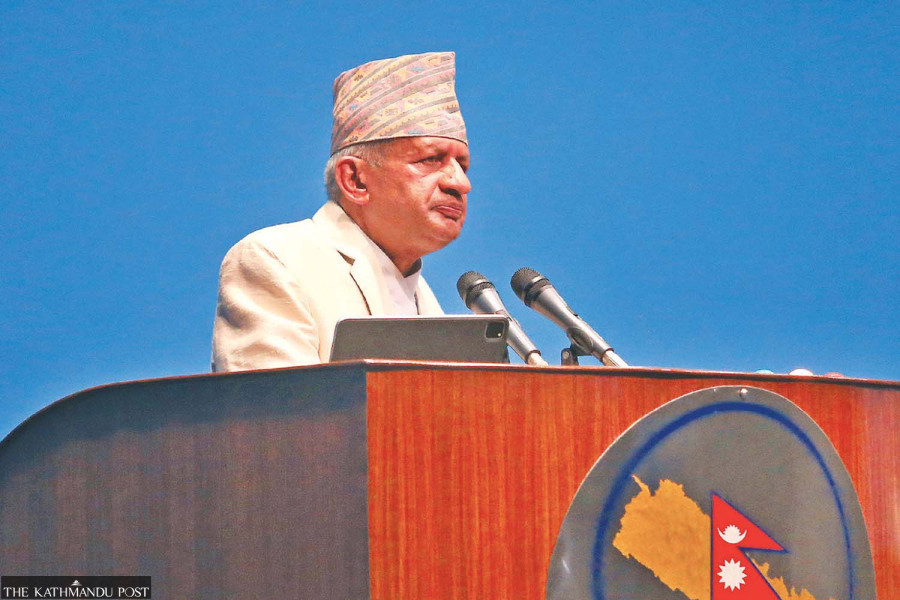Politics
After holding House hostage for 8 months, UML lifts obstructions
Main opposition says it will remodel its protest and will allow proceedings in view of economic crisis and inflation.
Binod Ghimire
After obstructing the proceedings of the federal parliament for eight months to press a number of demands, the main opposition CPN-UML on Tuesday withdrew its protest in both the Houses of parliament.
The single largest party had been obstructing the businesses of both the Houses since September 8 last year protesting against Speaker Agni Sapkota’s decision not to expel 14 of its dissident lawmakers, who later formed the CPN (Unified Socialist).
The UML on August 17 had written to the Parliament Secretariat, appealing to expel 14 of its dissident lawmakers including Madhav Nepal. However, Sapkota on August 29 said there was no need to take action against them as they had already launched a new party. Then the party started obstructions demanding either the Speaker should quit or expel the dissidents. The party had refused to end its protests despite several attempts by the Speaker and parties for a compromise.
However, on the first day of 11th session of the federal parliament on Tuesday, the UML announced an end to its obstructions although its demands remain unaddressed.
“We have decided to change the nature of our protest as the House needs to hold serious discussions on the ongoing economic crisis and inflation,” Pradeep Gyawali, a UML lawmaker and deputy general secretary, said, addressing the House meeting. “We, however, will continue to criticise the wrongdoings of the Speaker who was complicit in the government move to split our party.”
The Sher Bahadur Deuba government in August last year issued an ordinance to make it easier for the dissident Madhav Nepal-led faction of the CPN-UML to splinter from the party. The Nepal faction on August 25, 2021 launched the CPN (Unified Socialist). Although the UML had recommended action against the dissidents on August 17, Sapkota waited until the new party was formed and then said it was no longer necessary to expel the 14 lawmakers.
The main opposition started the protest from the first meeting of the ninth session of the parliament that commenced on September 8.
Since then, just two government proposals—the national budget and the Millennium Challenge Corporation Nepal Compact—and four budget-related bills have been passed by the federal parliament amid sloganeering by the UML.
“The UML decision to continue the obstruction for months was a result of its short sightedness and this appears to have also impacted the party’s electoral showing,” Som Bahadur Thapa, a former secretary at the Parliament Secretariat, told the Post. “I don’t understand why the party wasted parliament’s crucial time if it had to ultimately surrender its demand.”
UML leaders, meanwhile, argued that their protest was aimed at the illegal formation of the CPN (Unified Socialist) and now that the electorate have rejected the party in the local elections, they have decided to end their protest in parliament.
The Nepal-led party by Tuesday evening had won five local units and maintained leads in 14 others. “The people through their votes have given a verdict against the Unified Socialist,” Bishal Bhattarai, the UML’s chief whip, told the Post.
Though UML leaders claim the Unified Socialist has faced a huge setback, their own party is also likely to fare poorly if the preliminary election results are any guide. The UML, which had emerged as the largest party in 2017 winning 294 local units, had won 101 local units by Tuesday and maintained leads in 92 others. It is set to lose close to 100 local units based on the preliminary results.
“The results of the local elections could have served a lesson to the UML and prompted it to withdraw the protest,” said Taranath Ranabhat, a former Speaker. “It is good that it has corrected its wrong decision as the government is preparing to present the budget for the new fiscal year.”
With the UML’s withdrawal, the government on Tuesday presented eight ordinances while Finance Minister Janaradan Sharma presented the principles and priorities of the upcoming budget, setting a tone for pre-budget discussions.
Pre-budget discussions will be held on Wednesday and Thursday. There is a constitutional obligation to present the national budget on May 29.
Earlier, on Tuesday, before deciding about ending its protest in the parliament, the UML had organised a meeting of its lawmakers at party chair KP Sharma Oli’s residence. “Our meeting has concluded that the party needs to inform the people about the government’s wrongdoings through the parliament,” Bhattarai, the chief whip, told the Post. “Also, the critical economic condition the country is going through needs to be discussed in parliament.”
Experts on parliamentary affairs say the current budget session could be the last session of the parliament. The country is likely to go to parliamentary elections later this year, so the parties should act responsibly and ensure that maximum number of pending bills are endorsed, they say. It is possible that the parliamentary elections are held in November. So, in addition to passing the bills related to the national budget, there are over 55 bills awaiting parliamentary endorsement. “It is necessary that the government and the parties make maximum use of this session to endorse as many bills as possible,” said Thapa, the former secretary of the Parliament Secretariat.




 17.12°C Kathmandu
17.12°C Kathmandu















